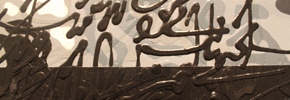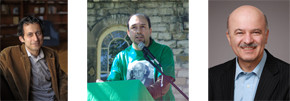Sima Sahar Zerehi – You can tell a lot from a holiday greeting. A crisp envelope made with artisan paper eloquently addressed by a calligrapher; a handmade card lovingly crafted with personal touches and individual flare; or one of those hastily picked one dollar convenient store jobs, featuring an out-dated floral design or a cheesy picture of a cat or dog dressed in seasonal gear, all communicate different messages.
The kind of greeting you receive from friends, family and acquaintances speaks volumes about their feelings towards you and how highly you rank in their esteem. A standard group email greeting says, hey you’re on my contact list, while a personal email or Facebook message says you’re on my mind, and a carefully constructed handwritten note says you’ve got a corner of my heart.
So what did political leaders have to say to the people of Iran this Nowruz through their New Year greetings?
For Iranian Supreme Leader Ayatollah Khamenei, the figurehead of the Islamic regime, it was all about a solemn and dignified Nowruz sprinkled with the customary call to jihad.
Khamenei’s Nowruz message begun on a heavy note with him calling attention to the political turmoil in the region – conspicuously leaving Syria not to mention Iran, off the list. The soon to be ex-Supreme Leader made special reference to the people’s movements in Bahrain, Yemen and Libya.
While heralding the efforts of the brave people of Bahrain and Yemen in opposition to their oppressive governments he stated that, “This year’s Eid has been embittered by events that have occurred in some countries.”
He noted that it is impossible to properly give way to the spirit of the season in light of these events and prayed for a positive and speedy outcome to the political turmoil without clarifying what this may be.
But it wasn’t all doom and gloom in the Ayatollah’s televised holiday greeting, Khamenei also added some levity to his message by noting that “fortunately with the movement that has commenced in the Islamic world, one feels that this decade will also be a decade of progress for the region.”
Clearly, the Ayatollah has drank heavily from his own Kool-Aid as he sees the uprisings as a continuation of the Islamic Revolution of 1979 which made it possible for his government to take political control of Iran.
Moving from martyrdom to political spin, the Ayatollah landed straight in the familiar territory of jihad. He declared, “I call this year ‘The Year of Economic Jihad’ and I expect the officials of the country, whether in government, in Majlis, or in other sectors which are related to economic issues, and also those from our dear nation to work in a jihadi way in the economic areas.”
Taking a customary swipe at Western nations Khamenei noted: “These sanctions that the enemies of the Iranian nation have prepared or enforced against the Iranian nation were intended to strike a blow against the country’s progress and prevent its rapid move.”
Interestingly, for the first time, Khamenei also addressed Iranians living outside of the country in his New Year message, a move that can only speak to the regime’s growing awareness around the importance of the Diaspora.
Iranian President Mahmoud Ahmadinejad’s televised Nowruz message proceeded Khamenei’s. The President echoed the Supreme leader’s emphasis on the economy, but while the clerics response was packaged as a religious mission in the form of a jihad, the President’s was a straight up political bill-of-goods chalked full of empty promises and hefty bribes.
Following in the footsteps of the Saudi King Abdullah bin Abdul-Aziz, the Iranian President offered the people of Iran his homemade bribes intended to silence the dissenting masses.
Ahmadinejad stated, “In the areas of production, industry, agriculture, finance and economics, 2.5 million jobs will be created.”
The Iranian President went on to top the bribes with empty promises by stating, “the potential of the people of Iran has built the hope that it is possible in the next two to three years to uproot the problem of joblessness in the country.”
Heydar Moslehi, the head of the Ministry of Intelligence in Iran offered his own version of a Nowruz greeting, which can be summed up as “if you can’t beat them, join them.”
After over thirty years of attempting to undermine Iran’s pagan traditions such as Nowruz and Chaharshanbe-suri, Moslehi offers a different solution. If the people of Iran refuse to let go of these un-Islamic traditions, we will gloss them over with an Islamic glaze.
In a statement to ISNA, the official government sponsored student news agency in Iran, Moslehi explained that as there are references in the Quran to the changing of the seasons, and the process of death and rebirth, and since Nowruz is a celebration about the beginning of spring and the rebirth of the natural world, therefore Nowruz is to be ‘accepted’ by the clerics in Iran through the religious leadership of Supreme Leaders Ayatollah Khomeini and Khamenei.
Translation: since we’ve done our best to get rid of this pagan celebration to no avail, we are now going to try to co-opt it.
In Canada Prime Minister Harper offered the political version of a one-dollar convenient-store card. His Nowruz greeting was a cliché medley of empty cut-and paste season’s greetings, with the vague reference to the celebration and best wishes inserted.
While Harper spoke of setting the table with a Haft-sin spread – Obama set the stage for a new world order.
In his third Nowruz address, President Obama signalled a clear shift in the US foreign policy line towards Iran. In his first Nowruz address in 1388 (2009), Obama had attempted to extend an olive branch to the Iranian government, in his second address in 1389 (2010) Obama attempted to speak to both the Iranian government as well as the Iranian people and emphasize diplomatic relations.
But in this year’s Nowruz address, Obama spoke primarily to the people of Iran reserving very few words for the regime.
Obama equated Nowruz with “the promise of a new day” for the region. He stated, “After all this is a season of hope and renewal, and today we know that this is also a season of promise across the Middle East and North Africa, even as there are also enormous challenges.”
The American President also highlighted Iran’s pivotal role in the region’s pro-democracy movements. He stated, “We also know that these movements for change are not unique to these last few months. The same forces of hope that swept across Tahrir Square were seen in Azadi Square in June of 2009.”
Obama also shamed the Iranian regime by speaking about their “campaign of intimidation and abuse” against the people of Iran and itemizing some of their human rights abuses and referencing a few of Iran’s most prominent political prisoners including, filmmaker Jafar Panahi and human rights lawyer Nasrin Sotoudeh.
Speaking of Iran’s record of human rights abuses, Obama stated, “These choices do not demonstrate strength, they show fear, for it’s telling when a government is so afraid of its own citizens that it won’t even allow them to access information or to communicate with each other.”
In his closing remarks, Obama spoke of the centrality of Iranian youth in the future of the country. He noted, “The future of Iran belongs to the young people, the youth who will determine their own destiny. Over 60% of the Iranian people were born after 1979 they’re not bound by the chains of the past.”
He added, “you, the young people of Iran, carry within you both the ancient greatness of Persian civilization and the power to forge a country that is responsive to your aspirations, your talent, your hopes and your choices will shape the future of Iran and help light the world.”
In a clear signal to the youth of Iran, of the US support for the pro-democracy movement Obama declared, “although times may seem dark, I want you to know that I am with you.”
Masterfully Obama closed his well-crafted greeting with a line from a poem by prominent poet Simin Behbahani, who has been refused permission to leave Iran since 2010. The quote is translated as, “Old I may be, but given the chance I will learn, I will begin a second youth alongside my progeny.”






